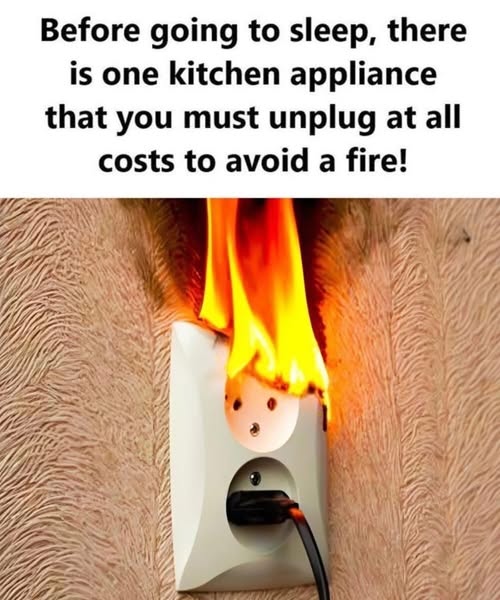
In today’s fast-paced world, appliances like air fryers and toaster ovens have become essential tools in many kitchens. They offer quick, efficient cooking with minimal cleanup—making them popular among busy families, students, and home cooks alike. However, despite their convenience, these small countertop devices can pose serious fire risks, even when they’re not actively being used.
What many people don’t realize is that some models are manufactured using substandard internal components, including low-quality wiring, overheating-prone circuitry, or insufficient insulation. Over time, these parts can degrade due to heat exposure, moisture, or simple wear and tear. In some cases, this deterioration may cause short circuits, sparks, or even spontaneous ignition, especially if the appliance remains plugged in for extended periods.
Leaving these appliances plugged in overnight or when you’re not home further increases the risk. Power surges, often caused by lightning, overloaded circuits, or sudden electrical fluctuations, can push these already vulnerable devices past their limits. This is especially dangerous in homes with older electrical systems, where outlets may not be grounded or up to modern safety standards. Under such conditions, a small spark can quickly turn into a serious electrical fire, putting lives and property at risk.
Although other small kitchen devices—like electric kettles, coffee machines, toasters, and older microwave ovens—can also present similar hazards, air fryers and toaster ovens have recently come under increased scrutiny. Consumer safety groups and fire departments across various regions have reported a rising number of incident cases, many of which involve overheating, melting plastic, or smoke emission from units that were either faulty or simply left plugged in when idle.
These incidents are not limited to faulty or low-end models. Even some high-end brands have issued recalls after discovering fire hazards in their appliances, typically due to manufacturing defects or lack of sufficient safety failsafes. What’s alarming is that many of these appliances give no warning signs before malfunctioning—no burning smell, no noise, no flickering lights—making the threat even more insidious.
To protect yourself, your family, and your home, the best and simplest practice is to unplug air fryers, toaster ovens, and other small appliances when they are not in use. This small daily habit dramatically reduces the chances of electrical faults and keeps unnecessary current from running through aging components. It’s also worth inspecting your outlets regularly and ensuring that your home’s wiring is up to code, especially if you live in an older building. Hiring a certified electrician for a home safety check can identify potential problems before they escalate.
Additionally, avoid using cheap extension cords or power strips to operate these appliances. Instead, plug them directly into wall sockets whenever possible, and keep flammable materials like dish towels or paper napkins far away from any cooking device.
Finally, never ignore signs of trouble. If your appliance smells odd, makes strange sounds, heats up excessively, or causes your lights to flicker when in use, stop using it immediately and consult a professional or the manufacturer. Regular maintenance and mindful habits are key to preventing avoidable disasters.
In Summary
Air fryers and toaster ovens may make meal prep easier, but they come with hidden electrical dangers—especially if left plugged in when not in use. By staying aware, unplugging when finished, and keeping your electrical system in good shape, you can greatly reduce the risk of fire and ensure your kitchen remains a safe space. Taking just a few seconds to unplug an appliance could save your home—and your life.